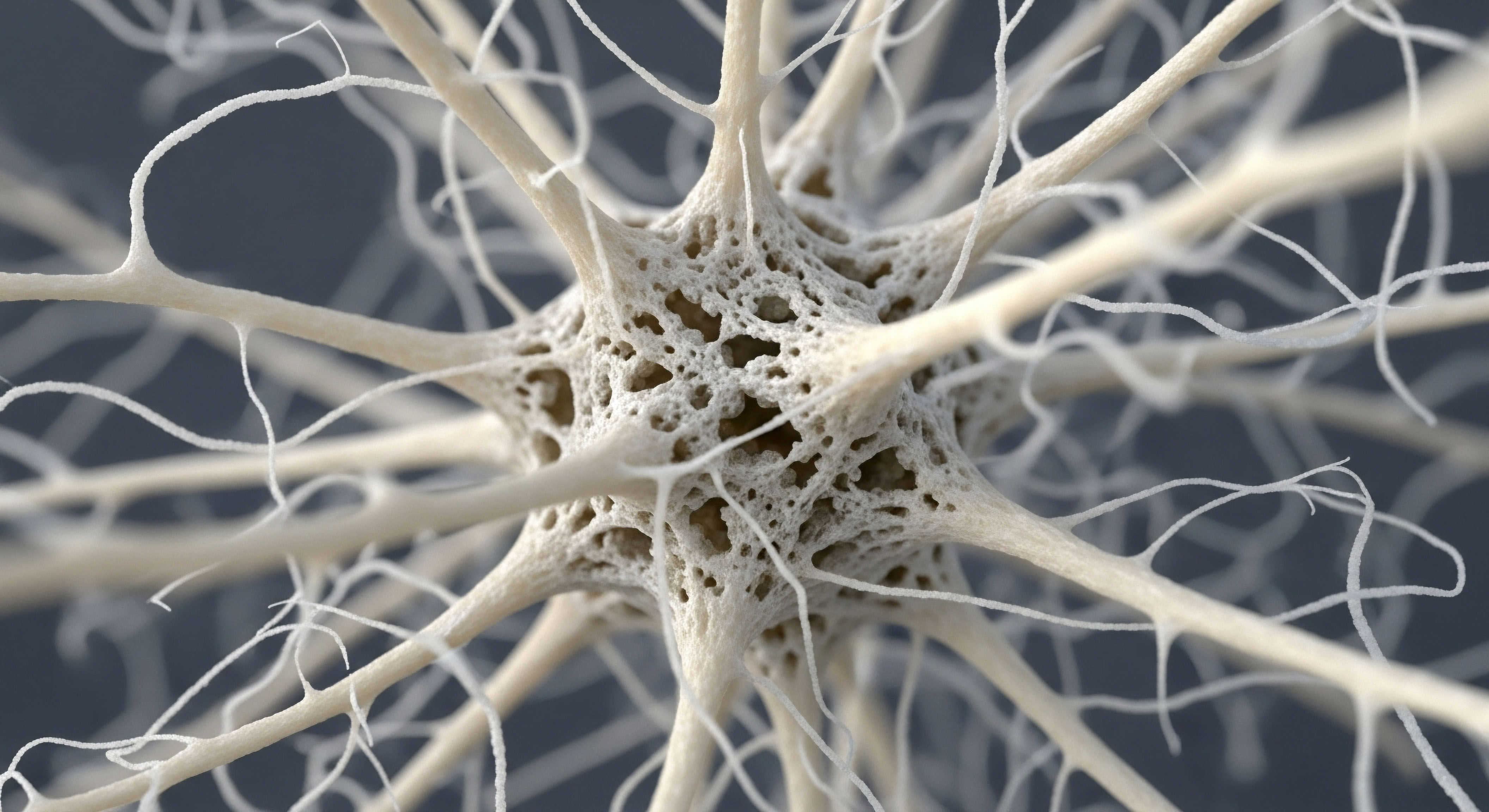

The Chemical Signature of Command
Your mind is a reflection of your chemistry. The sense of drive, the speed of recall, and the capacity for deep focus are governed by a silent, powerful force ∞ the endocrine system. This network of glands orchestrates your mental state by releasing precise hormonal signals that instruct your brain cells how to perform.
Thinking of the brain as an isolated processor is a fundamental error. It is a supremely powerful receiver, constantly interpreting a chemical broadcast that dictates its operational capacity. Mental mastery, therefore, begins with mastering the broadcast itself.
The quality of your cognitive output is a direct consequence of your hormonal signature. Key signaling molecules are the architects of your ambition and the guardians of your intellect. Understanding their role is the first step in moving from a passive passenger in your own biology to the pilot of your physiological system.

Testosterone the Engine of Drive
Testosterone is the molecule of assertion. It modulates dopamine pathways, directly influencing your appetite for risk, your competitive spirit, and your motivation to pursue goals. When levels are optimized, the result is an amplified sense of purpose and a sharpened ability to execute decisions under pressure. It constructs the framework for confident action and mental resilience.

Estrogen the Guardian of Neural Integrity
Estrogen holds a profound neuroprotective role, safeguarding neurons from damage and supporting synaptic plasticity, which is the bedrock of learning and memory. It is essential for verbal fluency and the formation of new neural connections. Its presence ensures the brain’s hardware remains supple, efficient, and capable of high-speed data transfer and retrieval. This is a critical component for maintaining cognitive agility over a lifetime.
A study in the Journal of Clinical Endocrinology & Metabolism found that higher levels of free testosterone in older men were directly associated with better performance on tests of verbal memory, visual memory, and processing speed.

Thyroid the Pacesetter for Cognitive Metabolism
Thyroid hormones, specifically T3 and T4, set the metabolic rate for every cell in your body, including your brain. They govern the speed at which your mind operates. An optimized thyroid state translates to rapid thought processing, mental clarity, and sustained energy. Sub-optimal levels create a drag on the entire system, resulting in mental fog, slowed cognition, and a blunted emotional response. They are the gatekeepers of your brain’s processing power.


Calibrating the Neural Switchboard
The endocrine system operates on a series of sophisticated feedback loops, the most critical being the Hypothalamic-Pituitary-Gonadal (HPG) and Hypothalamic-Pituitary-Adrenal (HPA) axes. These are the master control systems that regulate the release of performance-defining hormones. Viewing these axes as static is incorrect; they are dynamic systems that can be calibrated for superior output. The process involves a precise, data-driven approach to understanding your unique biological baseline and then making targeted adjustments.
Optimization is an act of biological engineering. It requires moving beyond population averages and into personalized, high-resolution data. This is achieved through comprehensive biomarker analysis, which provides a quantitative snapshot of your internal chemical environment. With this data, interventions can be designed to fine-tune the signaling pathways, ensuring your brain receives the exact chemical instructions required for peak performance.

The Core Calibration Targets
The goal is to ensure each hormonal signal is clear, potent, and correctly timed. This involves assessing not just total hormone levels, but also their bioavailable fractions, carrier proteins, and downstream metabolites. It is a multidimensional diagnostic process aimed at building a complete picture of your endocrine performance.
The following table outlines the primary targets for cognitive calibration:
| Hormonal Axis | Key Molecule | Primary Cognitive Function | Indicator of Sub-Optimal State |
|---|---|---|---|
| HPG Axis (Male) | Free Testosterone | Drive, Risk Assessment, Focus | Procrastination, Indecisiveness |
| HPG Axis (Female) | Estradiol | Verbal Memory, Plasticity | Brain Fog, Memory Lapses |
| HPT Axis | Free T3 | Processing Speed, Mental Energy | Sluggish Thought, Low Mood |
| HPA Axis | Cortisol (AM/PM) | Stress Modulation, Memory Recall | Anxiety, Poor Sleep, Burnout |


Activating the Upgrade Protocol
The time to assess and calibrate your endocrine system is defined by performance metrics, not by age or the onset of disease. The conventional medical model is reactive, designed to identify pathology once it has already manifested. A performance-oriented model is proactive. It seeks to identify subtle declines in cognitive output and systemic vitality long before they become clinical problems. The trigger for action is the moment you detect a deviation from your peak mental state.
Research indicates that chronic stress, leading to dysregulated cortisol rhythms, can shrink the prefrontal cortex, the brain region responsible for executive functions like concentration and decision-making.
Waiting for a significant decline is an acceptance of mediocrity. The superior strategy is to monitor for the earliest signals of system inefficiency. This is the point where intervention delivers the most dramatic and lasting results, preventing the cascade of neurological and physiological downgrade. The protocol is activated by the desire to sustain and enhance a high-performance life.

Key Performance Indicators for Endocrine Assessment
Consider an assessment when you observe a persistent negative trend in any of the following areas. These are the early warning signs that your chemical broadcast is becoming distorted.
- A noticeable decrease in your competitive drive or professional ambition.
- The emergence of mental fog or a reduction in the speed of your thoughts.
- Difficulty with word recall or a decline in verbal sharpness.
- A diminished ability to handle high-pressure situations.
- Increased time needed for recovery from intense mental or physical effort.
- A flat-lining of mood or a loss of interest in rewarding activities.
- Disrupted sleep patterns, particularly difficulty staying asleep.
These are not merely signs of aging; they are data points indicating a specific system requires a targeted adjustment. Addressing them is a strategic decision to maintain your cognitive edge.

Mastery Is a Chemical Dialogue
Your conscious mind provides the intention, but your endocrine system determines the capacity to execute that intention. The highest performers in any field are those who, consciously or unconsciously, have established a powerful synergy between their goals and their biology. True mental mastery is not an act of brute force.
It is an elegant, ongoing dialogue with your own chemistry. Learning the language of that chemistry, and how to modulate it with precision, is the ultimate key to sustaining peak cognitive command and authoring the full extent of your potential.



